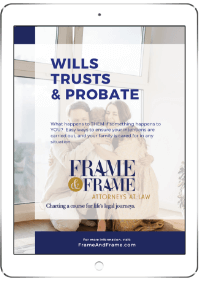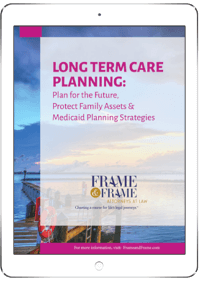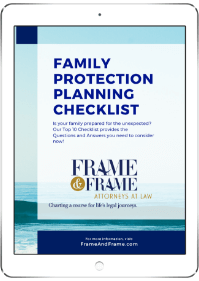There are several reasons why someone would prefer to avoid probate including the following:
- Probate is a process that takes place in a public court. Many people would prefer to keep their affairs private, even after death.
- Probate can be avoided by establishing a revocable living trust, or many other types of trusts, that convey assets at death according to instructions set forth by the decedent in the trust agreement prior to death.
- Probate can be avoided in the case of a simple estate with limited assets. For example, assets can be legally transferred through bank accounts with beneficiary designation and a specific type of deed so that the surviving designated individual automatically receives ownership of the real estate.
- Probate should be avoided in the case of a blended family where a parent was divorced, remarried, and has children from one or both marriages. If there was no Will, or the Will was invalidated by the probate court, the rules of the state regarding heirs and inheritance prevail. These rules do not consider blended family issues. As a result, surprises during probate can occur that leave some family members without their expected inheritance. Such surprises can be avoided with proper planning prior to death.
Why Probate is Necessary
Probate is necessary to transfer a deceased person’s assets to his or her beneficiaries. Even if the deceased person has left a Will, the estate assets cannot be transferred until the Will has gone through probate. Probate involves a court procedure and a series of legal requirements that must be satisfied before assets can pass to the beneficiaries. How complicated an estate administration is depends on the following:
- Did the deceased person leave a Will?
- Was an executor named in the Will?
- What is the nature of the deceased person’s assets?
- Are there creditor claims?
- Do any tax elections need to be made?
- Were any trusts created in the Will?
You Can Resolve Issues Before Death and Avoid Probate
With the help of an estate planning attorney before death, you can resolve all the above issues in a legal manner to avoid probate. An experienced estate planning attorney can help prepare your assets so they are ready for transfer to your loved one when you pass away, privately and cost-effectively, in a manner that fulfills your personal goals.
Probate Takes Time and Money
Other considerations may indicate a need to avoid probate. Speed and privacy are important when passing on the family business or other sensitive assets of a family. Many court dockets are backlogged, despite every effort to process cases efficiently. A probate can take months, which puts a strain on the survivors who experiencing the grieving process on top of the court process. Not only that, it takes money to process the required legal documents and other fees can pile up. All the money required to process a probate to its legal conclusion, satisfy debts, and pay any tax liability comes out of the funds of the estate, right off the top, thereby reducing the amount available for distribution to the beneficiaries after taxes and debt payments.
Blended Families Pose Unforeseen Probate Surprises That Can Be Avoided
A properly executed trust addresses the contingencies and complications resulting from marriage and divorce laws. Typically, a married couple owns property jointly. Upon the death of a spouse, the surviving spouse receives the marital assets. This may be troublesome for minor children when the couple is divorced or one spouse remarries. In a divorce, state law may provide automatic estate planning updates that void or alter some provisions of an existing estate plan. Divorcees must update their estate plans and powers of attorney after a divorce. Even when the couple is not divorced, surprises can happen because of the prevailing laws when one or the other dies.
Maryland Probate Law When There is No Will Can Lead to More Surprises
Perhaps you think you don’t need a Will because you believe that when you die, your assets Will pass automatically to your surviving spouse. But that’s not necessarily true. In Maryland, if a person dies without a Will and has minor children, the surviving spouse receives half of the residuary estate and the minor children receive the other half. If there are no minor children, then the surviving spouse receives the first $15,000 plus half of the balance of the estate and the adult children receive the other half of the estate divided among them. When there is a minor child by a prior marriage, the problem can be compounded. In that case, a court appointed guardian, who Will probably be the parent of the minor, in other words the ex-spouse, will hold the minor child’s share of the decedent’s estate. Such a result could really complicate someone’s life.
Reach Out to Us to Discuss How to Avoid Probate Problems
Our experienced probate attorneys can help you understand your estate situation so that probate problems can be resolved before death so your heirs receive their inheritance according to your wishes. You can be in control of what happens to your estate upon your death. Why delay? Contact our Frame & Frame Attorneys today. With offices in Pasadena and Stevensville, we serve communities in Maryland.






